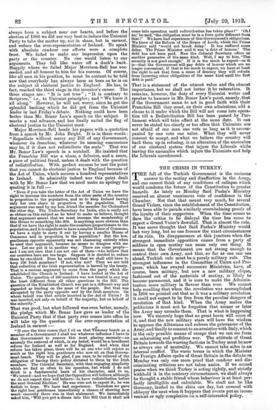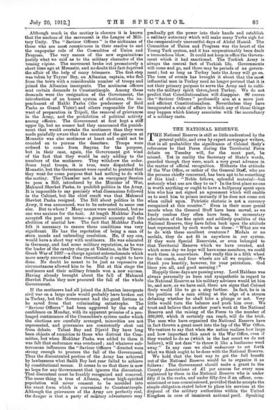1.11E CRISIS IN 1 URKEY.
fall of the Turkish Government is the ominous 1-1answer to the mutiny and disaffection in the Army, and one cannot think of any conditions of collapse which would condemn the future of the Constitution to greater hazards. As lately as Monday Said Pasha's Ministry received an almost unanimous vote of confidence in the Chamber. Not that that meant very much, for several Grand Viziers, since the establishment of the Constitution, have been able to parade similarly overwhelming proofs of the loyalty of their supporters. When the time comes to dare -the critics to be disloyal the time has come to expect a Grand Vizier's downfall. That is almost the rule. It was never thought that Said Pasha's Ministry would last very long, but no one foresaw the exact circumstances of its ruin. Its disappearance at this juncture when the strongest immediate opposition comes from a party of soldiers in open mutiny can mean only one thing. It means that the Government are not strong enough to control their own Army, and that, so far as one can see ahead, Turkish rule must be a purely military rule. The strongest influences in the Committee of Union and Pro- gress, which has swayed successive Ministries, have, of course, been military, but now a new military clique, fashioned out of the materials of mutiny, is likely to become paramount, and it is sure to make the Adminis- tration more military in flavour than ever. We cannot help recalling that when the revolution was accomplished. in 1908 we pointed out that as it was a military revolution it could not expect to be free from the peculiar dangers of revolution of that kind. When the Army makes the politicians it must not be forgotten that sooner or later the Army may unmake them. That is what is happening now. We sincerely hope that no great harm will come of it, and that the new military stars will have the wisdom to appease the Albanians and redress the grievances of the Army, and finally to consent to an armistice with Italy, which is the only possible means of escape that we can see from an exhausting and profitless war. The attitude of Great Britain towards the warring factions in Turkey must be now' as always one of neutrality. We cannot take sides in an internal conflict. The warm terms in which the Minister for Foreign Affairs spoke of Great Britain in the debate on Monday was only one more proof that candour and dis- criminating criticism are not taken amiss. If we accord praise when we think Turkey is acting rightly, and strictly withhold it in the contrary circumstances, we shall always be thought a stable friend whose behaviour is at least per- fectly intelligible and calculable. We shall not be like Germany, lauded to the skies one day, but covered with: obloquy the next when it happens that events put an incon- venient or ugly complexion on a self-interested policy. Although much in the mutiny is obscure it is known that the nucleus of the movement is the League of Mili- tary Unity. The "Saviour Officers" is the nickname of those who are most conspicuous in their resolve to end the unpopular rule of the Committee of Union and. Progress. The very names of the new organizations justify what we said as to the military character of the coming regime. The movement broke out prematurely a short time ago at Monastir, and no doubt this fact deprived the affair of the help of many trimmers. The first step was taken by Tayyar* Bey, an Albanian captain, who fled from the town with. a considerable number of troops and. joined the Albanian insurgents. The mutinous officers sent certain demands to Constantinople. Among those demands were the resignation of the Government, the introduction of an honest system of elections, the im- peachment of Hakki Pasha (the predecessor of Said Pasha as Grand Vizier) and others responsible for the want of preparation in Tripoli, the removal of grievances in the Army, and the prohibition of political activity among officers. The Government at first kept a stiff upper lip, but no sooner had they announced the punish- ment that would overtake the mutineers than they were made painfully aware that the remnant of the garrison at Monastir was also mutinous at heart and could not be Counted on to pursue the deserters. Troops were ordered. to come from Smyrna for the purpose, but in their case, again, the Government got wind of the fact that they would be only adding to the numbers of the mutineers. They withdrew the order. Some loyal troops, it is true, were dispatched to Monastir, but the Government were careful to pretend that they went for some purpose that had nothing to do with the mutiny. The Chamber met in an emergency Session to pass a Bill, introduced. by the Minister of War, Malnuud Shevket Pasha, to prohibit politics in the Army. It is impossible to say precisely what dissensions followed in the Cabinet, but the chief result was that Mah mud Shevket Pasha, resigned. The Bill about politics in the Army, it was announced, was to be entrusted to some one else. But to whom ? Many names were mentioned, but no one was anxious for the task. At length Mukhtar Pasha accepteff the post on terms—a general amnesty and the abolition of martial law. The fact that Mukhtar Pasha felt it necessary to ensure these conditions was very significant. He has the reputation of being a man of stern moods and unbending resolution. He, if any one, would have a short way with mutineers. He was educated in Germany, and had some military reputation, as he was the leader of the cavalry charge at Velestino, in the Turco- Greek War of 1897—a charge against entrenchments which more nearly succeeded than theoretically it ought to have done. No doubt he meant to be just as repressive as circumstances allowed him to be. But at this stage the mutineers and their military friends won a new success. Having already brought about the fall of lllahmud Shevket Pasha they now procured the fall of the whole Government.
If the mutineers had all joined. the Albanian insurgents civil war on a large scale would probably have broken out in Turkey, but the Government had. the good fortune to be saved from that culminating catastrophe. The " Saviour Officers" had been aggrieved by the vote of confidence on Monday, with its apparent promise of a pro- longed continuance of the Committee's system under which the elections are carefully arranged, minorities are not represented, and grievances are consistently shut out from debate. Talaat Bey and Djavid Bey have long been objects of suspicion to those who distrust the Com- mittee, but when Mukhtar Pasha was added to them it was felt that endurance was overtaxed ; and whatever sub- terranean influences the "Saviour Officers "directed. were strong enough to procure the fall of the Government. Thus the discontented portion of the Army has achieved. by lawlessness what Sadik Bey last year failed to achieve by constitutional means. It seems to us that there is now no hope for any Government that ignores the discontent. That discontent must be frankly recognized and removed. The same thing is true of Albania, whose high-spirited population will never consent to be moulded into the exact form which is convenient to Constantinople. Although the grievances of the Army are perfectly real, the danger is that a party of military adventurers may gradually get the power into their hands and establish a military autocracy which will make many Turks sigh for the comparatively uneventful days of Abdul Hamid. The Committee of Union and Progress was the heart of the Young Turk system, and it has unquestionably been dealt a tremendous blow. It could not keep in office the Govern- ment which it had. sanctioned. The Turkish Army is always the central fact of Turkish life. Governments will come and go, and there may be periods of no govern- ment; but so long as Turkey lasts the Army will go on. The turn of events has brought it about that the most influential men in Turkey need. no longer pretend that it is not their primary purpose to serve the Army and to culti- vate the military spirit throughout Turkey. We do not predict that Constitutionalism will disappear. Of course the "Saviour Officers" professedly aim at a more just and efficient Constitutionalism. Nevertheless they have inaugurated a state of affairs in which any of those things may happen which history associates with the ascendancy of a military caste.







































 Previous page
Previous page